KUALA LUMPUR, June 24 — The local ulama council in the conservative Indonesian province of Aceh has declared PlayerUnknown’s Battlegrounds (PUBG) as haram citing fears that the game can be addictive and encourage violent behaviours among the game’s predominantly young player base.
“We’ve seen that children and even adults in Aceh are starting to get addicted to the game and they’re playing it everywhere on their mobile phones,” said the ulama council’s deputy chairman, Faisal Ali.
He also added that PUBG and similar games “insults Islamic symbols”.
The council deliberated for two days before declaring the game and other similar games as haram. However, the council’s ruling has no legal implications and it is not considered a law.
While one can consider Aceh’s ulama council ruling as merely an advise, other countries have enacted firm legislation banning PUBG and other games.
In May this year, Iraq’s Parliament has voted to ban several games including PUBG, saying that the games are harmful to the health, culture and security of the Iraqi society.
In some parts of India, the game has also been restricted with politicians calling for an outright national ban. Earlier this year, 10 students were detained by Indian police for playing PUBG. Police officials said the students were apparently “so engrossed” in the game that they didn’t look up and notice that the police had arrived to arrest them.
The game is also banned in Nepal with the government ordering ISPs and mobile operators to restrict user access to the game citing a similar reason — that violent video games are detrimental to the society promoting addiction and aggression.
But do video games encourage violence?
PUBG is one of the most popular video games of all time. In 2018 alone, there were over 400 million players around the world but is it accurate to say that violent games encourage violent behaviour?
Experts are still sceptical about the correlation between violent behaviour and violent video games with many saying that there is not enough data to conclusively say that it does. Some quarters also present data that shows despite the massive increase in sales of violent games, violent crimes among youths — in America at least — have gone down.
<>
In any case, where you do stand in the whole violent games encourage violence in real-life debate?
I have four young boys, I play PUBG and Fortnite with them. Personally, while the young mind is impressionable, to solely blame the degradation of society on video games alone is not looking at the big picture. One that greatly downplays the overall impact of society, friends, family and parents on shaping juvenile minds.
Outright bans are relatively easy to put in place that is why they are popular but they do very little to solve the problem. What would be more effective is more involvement from parents to develop the required analytical and critical thinking skills in their kids to differentiate what is right from wrong. — SoyaCincau






















